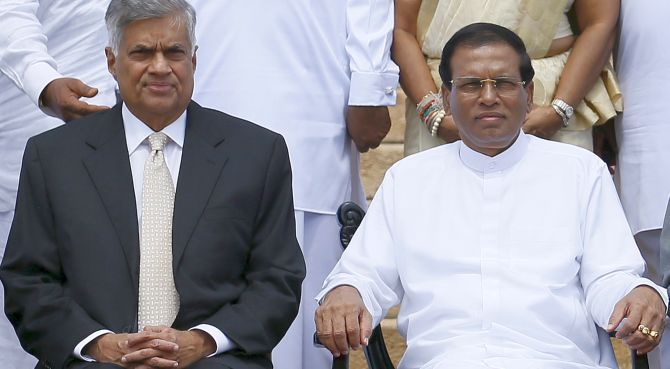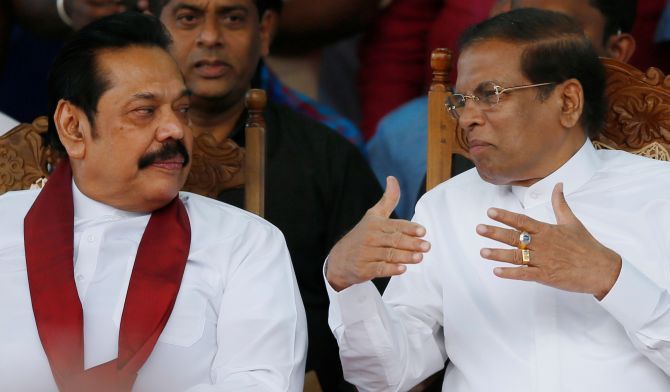Maithripala Sirisena was considered so meek and self-effacing that he appeared no threat to anyone.
What a mistake his rivals made!
Aditi Phadnis reports.

Remember Giani Zail Singh, arguably the wiliest President India has ever had, who came close to dismissing Rajiv Gandhi's government via a Constitutional coup, notwithstanding the Congress's unprecedented majority in the Lok Sabha?
Zail Singh failed. But Maithripala Sirisena, Sri Lanka's president, didn't.
Last fortnight, in one fluid stroke, he sacked Prime Minister and United National Party leader Ranil Wickremesinghe, replaced him with Sri Lanka People's Party and Opposition leader Mahinda Rajapaksa and presented MPs with a fait accompli: If they wanted to stay MPs in the current parliament, they needed to support Rajapaksa.
If not, they should prepare for snap elections. (Late on Friday, November 9, Sirisena dissolved parliament and called a January election.)
Sirisena himself has nothing to lose -- presidential elections are due end 2019-beginning 2020. Parliamentary elections were originally scheduled only in August 2020.
When he became president in 2015, Sirisena said: 'I came out because I could not stay any more with a leader who had plundered the country, government and national wealth.' He was Mahinda Rajapaksa's health minister, considered a man so meek and self-effacing that he appeared no threat to anyone.
But for all his modest origins, Sirisena was an extremely powerful leader: He began as a youth leader in the left-leaning Sri Lanka Freedom Party, became president of its youth wing in 1983. He became an SLFP MP in 1989 representing Polonnaruwa, built the party in central Sri Lanka and rose to become SLFP chairman in 2000.
In 2001, he was appointed SLFP general secretary and he stayed in that position till 2014, making him the longest serving secretary in the party's history. And this when he belonged to no ruling dynasty like the Bandaranaikes or the Jayewardenes. Nor did he belong to the Colombo 7 crowd, roughly corresponding to Lutyens Delhi.
Mahinda Rajapaksa, deputy to Chandrika Kumaratunga, rebelled against her and forced her to cede power to him. When presidential elections beckoned in 2015, Kumaratunga thought she could use Sirisena to pay back Rajapaksa. So she nudged him to defect, helped cobble together an alliance of bitter political opponents SLFP and UNP (a bit like the Congress and the BJP), their only objective being to keep Rajapaksa out.
Sirisena won the presidential election, vowed to end the executive presidency that allows the president to have overarching powers of hiring and firing ministers but didn't really get round to doing it, and promised to usher in a rule of 'compassion and justice'.
Tensions were inevitable and they began showing from day 1.
Prime Minister Ranil Wickremesinghe's involvement in a bonds scandal and the replacement of the governor of the central bank suggested high levels of corruption though Wickremesinghe was absolved of blame in an enquiry. But he did not step down when the enquiry was going on.
Wickremesinghe struggled to bring some balance in the economy but Sirisena's socialist orientation balked at having to divest in government-run entities and other market-oriented initiatives.
The central reason was the presidency: How could Sirisena get another term?
Wickremesinghe himself wanted the presidency. Sirisena had to make arrangements for a second term for himself.
So in three years, amid a lacklustre performance of a government which nevertheless won a trust vote in April this year, Sirisena felt he needed to return to the mother fold -- of Rajapaksa who, the most pragmatic of all politicians, was waiting, willing to forgive and forget past betrayals.
But is it going to be so easy for Sirisena to attain his objective?
Gotabhaya Rajapaksa, former defence secretary and Mahinda Rajapaksa's brother, has already launched a political forum.
If he is elected prime minister in the January election, Mahinda Rajapaksa can amend the constitution and remove the two-term bar on presidentship, then he could offer himself as president.
If not, then there is always Gotabhaya. Either way, Sirisena will become an inconvenience sooner than later.

There is one other danger. The Rajapaksa regime played ducks and drakes with the military. Chiefs of staff were sacked, superseded, imprisoned.
The present chief of army staff was denied his due in promotions by the Rajapaksas and went off to work with the US forces in Afghanistan until the government in Sri Lanka changed -- when he was made army chief nearly five years after he was due to be promoted.
If the Rajapaksa regime looks as if it is going to return, many in the armed forces will begin to feel extremely uneasy.
Even in the past when Sri Lanka had a ceremonial army, coups have not been unknown. And 'The War' is a way of life for the country even when the armed forces are not actively fighting one.
The minorities -- the Tamils because it was during Rajapaksa's presidency that the LTTE was destroyed; and Muslims because he identifies closely with Sinhala Buddhist nationalists -- cannot afford to back Rajapaksa.
Sri Lanka will continue to be turbulent for the forseeable future.










